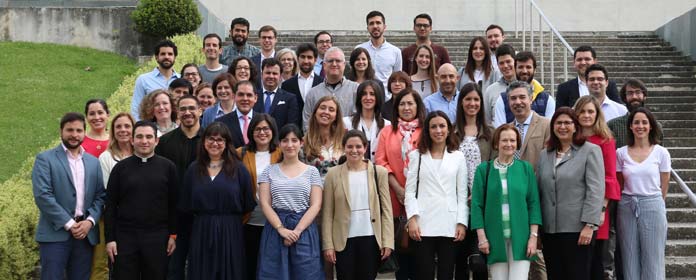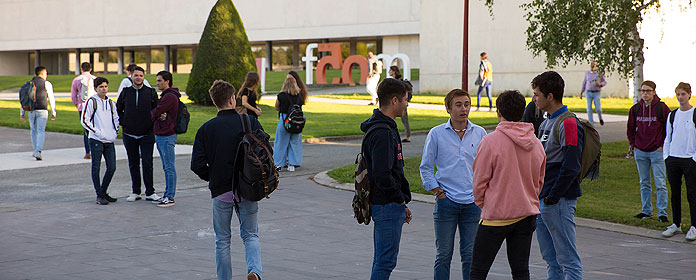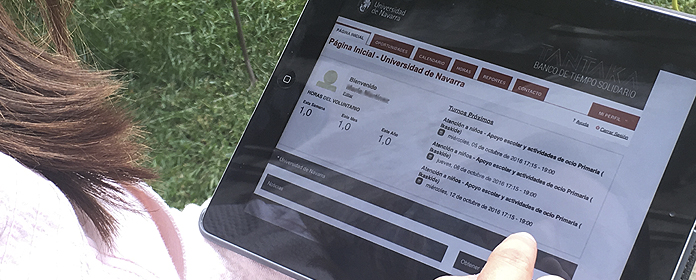Half a hundred PhD students from Humanities, Social Sciences and ICS present their research at an interdisciplinary workshop
It is the first edition of a forum to present, discuss and communicate the results of the research to an interdisciplinary audience.

PHOTO: Elena Beltrán
The doctorate is synonymous with hours and hours of reading on the Library Services, of conversations with the director of thesis , of sleepless nights maturing an idea... It is at this stage that the degree program of any researcher is established and that is why it is important that it learns to develop all the skills that it will deploy in the future.
One of them is the ability to present, discuss and communicate the results of their work to an interdisciplinary audience. To this end, the Institute for Culture and Society (ICS) of the University of Navarra has organized the I workshop of research Interdisciplinary for doctoral students of Humanities, Social Sciences and ICS.
According to the Scientific Coordination of the ICS, manager of the activity, a cutting-edge research increasingly requires handling several discourses, developing a mentality and habits that facilitate interdisciplinary work . It argues that, in addition to cultivating one's own discipline and becoming aware of its limits, it is important to develop the intellectual and moral capacities necessary to establish a fruitful dialogue with colleagues from other disciplines.
Various programmes of doctorateA total of 40 speakers and 15 assistants from different programmes of doctorate: Arts and Humanities y Philosophy (School of Philosophy and Letters); Philosophy (School Ecclesiastic of Philosophy); Nursing Science (School of Nursing); Communication and Applied Creativity (School of Communication); Law and Law of the Global Society: development economic, risk and social integration ( School of Law); Education and Psychology (School of Education and Psychology); Governance and Culture of Organisations (high school business and Humanism); History and Critical Analysis of 20th century Spanish Architecture (School of Architecture); and Applied Medicine and Biomedicine (School of Sciences).
Topics such as 'A discursive approach to post-crisis social inequality: From representation to exclusion', 'Does Big Data apply to Public Relations', 'Alcohol consumption in adolescence', 'Interdisciplinarity as an attitude staff and professional', 'The meaning of the environment of the professional internship in the model relationship between the nurse and the person/family cared for: getting to know the experiences of nurses' and 'Visual communication of climate change in social networks: role and influence of online video', among others, have been presented.
Gustavo Garduño, from School Law, particularly emphasises the multidisciplinarity of the event and appreciates the opportunity to find out what other doctoral students at the university are working on. "I would like us all to present the substance of our projects," he says. He has presented one on the national margin of appreciation, a tool that originated in Europe and which he intends to transfer to the Inter-American Human Rights System.
Katya Palafox, from School of Education and Psychology, has offered a discussion paper on development social, empowerment of women and promotion of motherhood. The experience has introduced her to "different points of view and from different areas" and has helped her to "systematise her thinking regarding the communication of research".
Berta Viteri, from the ICS, considers it a "very good initiative" to "discover other doctoral students and the research they develop, and to see if synergies can be established work". During the workshop she spoke on topic of her thesis , the role of women in American democracy in the context of the work of Alexis de Tocqueville.
Normally," he acknowledges, "we doctoral students are scattered around the campus and are not aware of the research that others are developing. Sometimes there may be connections between our topics and we are not aware of them.
PhD students from the University of Navarra enrolled:School of Architecture:
Beatriz de la Puerta Gancedo
Francisco Xabier Goñi Castañón
Mariano Salazar Ruiz
Miguel Ángel Valdés González
School of Communication:
María Fernanda Novoa Jaso
Tatiana Pereira Villazón
Leonor Solís Rojas
School of Law:
Maria Eugenia Baldessari
Roberto Cruz Palmera
Gustavo Garduño Domínguez
Julio Pohl
School Ecclesiastic of Philosophy:
Juan Gabriel Alfaro Molina
School from Education and Psychology:
Leire Gambra Echeverría
Fátima Ruiz Fuster
Katya Palafox Gómez
School of Nursing:
Cristina Alfaro Díaz
María Isabel Armendáriz Azcárate
Miriam Pereira Sánchez
School of Philosophy y Letras:
Alfonso Aparicio Basauri
María Paz Azparren Legarre
Marta Castillo
Gloria del Carmen Balderas Rosas
Francisco Durán Vian
María Antonia Frías Sagardoy
Selene Jiménez Segura
María Luisa Lecaros Monge
Susana Madinabeitia Manso
Santiago de Navascués Martínez
Juan Pablo Rodríguez Méndez
José María Sánchez Galera
Adrián Suárez Martínez
Elkin Darío Toloza Villalobos
Carlos Veci Lavín
Institute for Culture and Society:
Pedro Antonio de la Rosa Fernández-Pacheco
Adriana Gordejuela Senosiáin
Saqlain Hassan
Berta Viteri Ramírez
high school business and Humanism:
Jose E. Arizón Fanlo
Víctor Alejandro Meléndez García
Linda Paz Quezada



